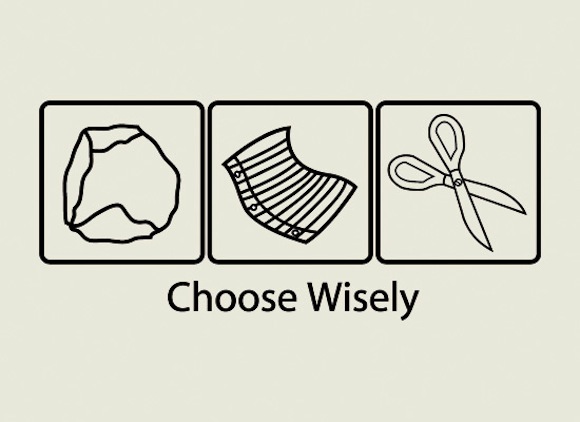
Rock-paper-scissors. Scissors-paper-stone. Roshambo. Elephant-man-ant. Whatever you call it, chances are you’ve played it at some point. In Japan, the game is known as janken, and is used to settle any kind of dispute or awkward situation, from who gets the last cookie to which parents have to sit on the PTA that year.
It’s not hard to see why janken is so popular in Japan: it’s simple, and everyone knows how to play. It’s also efficient (particularly if the thing being decided is trivial anyway). Decisions made by janken are stuck to religiously: in three years teaching Japanese schoolkids I never once saw a student complain about the result or demand a rematch. It’s seen as a fair way to make decisions, because the game is based on luck.
Or is it? A group of researchers from Chinese universities has published a paper that shows sure-fire ways to win at rock-paper-scissors. Join us after the jump as we explore how to outsmart small children at their own game!
Image: Japan National Tourism Organisation
The researchers split a group of 360 university students into groups of six, and had them play rock-paper scissors in pairs. For each game, the partner was chosen at random by a computer. Each time they won, they gained a small amount of money. The researchers studied how the players’ behaviour changed as they won or lost. Each student played 300 games, which took between 90 and 150 minutes. Yes, some of those crazy kids played janken for two hours straight!
The researchers observed that “if a player wins over her opponent in one play, her probability of repeating the same action in the next play is considerably higher than her probabilities of shifting actions.” So if you win with rock, you’re more likely to play rock again in the next game (because your brain is yelling: “ROCK FTW! Yeah, rock!!”).
However, if a player loses two or more times in a row, they are more likely to change their play. What’s more, they are more likely to change to the move that will beat the one they just lost to.
So, to become an unbeatable rock-paper-scissors champion, follow these three rules:
RULE NUMBER ONE
If you lose, in the next game play the move that will beat the one your opponent just played.
e.g. Your opponent beat you by playing scissors. Next, play rock, because she’s gonna play scissors again.
RULE NUMBER TWO
If you win twice in a row, don’t keep playing the same move – change it. And seeing as your opponent’s gonna play the thing that will beat the thing you just played, change to the thing that will beat that: the move your opponent just played.
e.g. You played paper, and your opponent played rock. You win! Next, you gotta play rock.
RULE NUMBER THREE
Don’t tell your opponent that you read this article. That would just be confusing.
Image: imgur via neogaf
Now off you go to suck all the fun out of the game and make small children cry.
Source: oreteki gēmu sokuhou
Top image: mathsyear7 wikispace